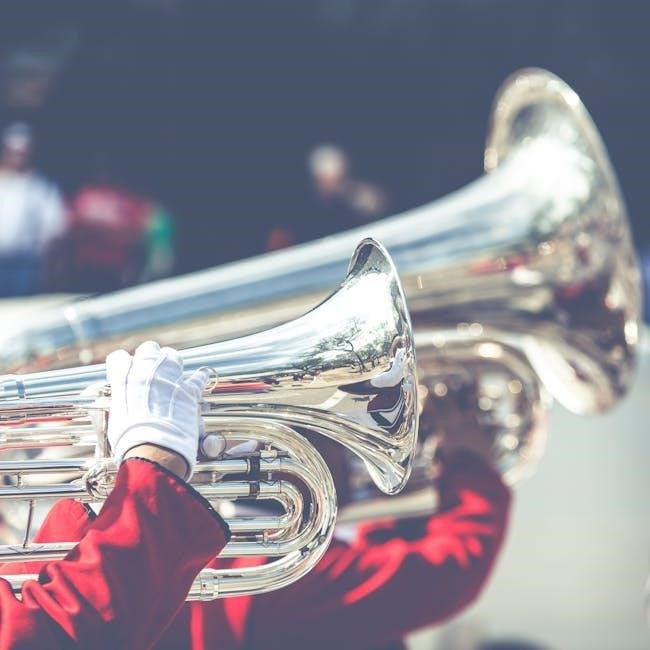
Herbert L. Clarke’s trumpet studies are a cornerstone of trumpet education, offering comprehensive technical and musical development. Originally written for cornet, these studies have been adapted for trumpet, remaining essential for players of all levels. The Clarke Trumpet Studies PDF provides a structured approach to improving technique, tone, and articulation, making it a timeless resource for aspiring musicians.
Overview of the Clarke Trumpet Studies PDF
The Clarke Trumpet Studies PDF is a digital adaptation of Herbert L. Clarke’s renowned method books for cornet and trumpet. This comprehensive resource includes Technical Studies, Characteristic Studies, and Setting-Up Drills, designed to enhance technical proficiency, tone production, and musicality. The PDF format ensures accessibility and convenience, allowing trumpet players to download and print the studies effortlessly. Originally published in 1912, Clarke’s works have been adapted for modern instruments while preserving their pedagogical value. The PDF is widely available online, often for free, making it a indispensable tool for students and professionals alike. Its structured approach covers a wide range of exercises, from basic techniques to advanced challenges, ensuring progressive development. Whether for practice or performance preparation, the Clarke Trumpet Studies PDF remains a timeless and essential resource for trumpet education.
Historical Significance of Clarke’s Work
Herbert L. Clarke’s trumpet studies hold a revered place in the history of brass pedagogy, shaping generations of trumpet and cornet players. Published in 1912, Clarke’s method books were pioneering, offering a structured approach to technical and musical development. As a renowned cornetist and educator, Clarke drew from his extensive performance experience to create studies that addressed the specific challenges of brass playing. His works, including Technical Studies, Characteristic Studies, and Setting-Up Drills, became foundational texts in trumpet education, influencing teaching methods worldwide. Clarke’s emphasis on proper technique, tone production, and articulation set a new standard for brass instruction. Over the years, his studies have been adapted for various instruments, such as euphonium and tuba, further cementing their legacy. Today, Clarke’s works remain indispensable, reflecting his profound impact on the evolution of trumpet and cornet pedagogy.

Structure and Content of the Clarke Trumpet Studies

The Clarke Trumpet Studies present a comprehensive curriculum with technical exercises, characteristic studies, and setting-up drills designed to enhance technique, tone, articulation, and range development in a structured manner for aspiring trumpet players.
Technical Exercises and Their Purpose
Herbert L. Clarke’s trumpet studies include a wide array of technical exercises designed to build foundational skills for musicians. These exercises focus on improving finger dexterity, breath control, and overall precision. By practicing scales, arpeggios, and complex melodic patterns, players can enhance their technical proficiency and musicality. Clarke’s exercises are structured to address specific challenges, such as high-note production, articulation, and phrasing, making them invaluable for both beginners and advanced players. The systematic approach ensures gradual improvement, helping trumpet enthusiasts master intricate passages with confidence. Additionally, these studies emphasize tone quality and intonation, which are crucial for achieving a professional sound. The exercises are complemented by setting-up drills, which reinforce proper technique and consistency. Overall, the technical exercises in Clarke’s studies provide a robust framework for trumpet players to refine their skills and achieve artistic expression.
Characteristic Studies for Trumpet Development
Herbert L. Clarke’s trumpet studies include characteristic studies designed to refine a player’s musicality and expression. These studies focus on developing tone, phrasing, and style, helping trumpet players master various musical genres and interpretations. By working through these exercises, musicians can improve their ability to play with dynamics, articulation, and emotional depth. Clarke’s characteristic studies also emphasize lyrical playing and the importance of connecting notes smoothly. They are structured to challenge players to think beyond technical proficiency, fostering a deeper understanding of musical interpretation. These studies are particularly useful for developing the ability to play with expression and nuance, which are essential for both classical and jazz performances. The characteristic studies complement the technical exercises by providing a creative outlet for applying newfound skills. They remain a vital part of trumpet education, helping players transition from mechanical practice to artistic performance.
Setting-Up Drills for Proper Technique
Herbert L. Clarke’s trumpet studies include specific setting-up drills designed to establish and refine proper technique. These exercises focus on building a strong foundation, ensuring players develop correct posture, breath control, and embouchure formation. The drills are structured to improve finger dexterity, accuracy, and coordination, which are essential for mastering more complex pieces. Clarke’s approach emphasizes consistency and repetition, helping musicians develop muscle memory and a reliable technical framework. These drills also address common challenges, such as intonation and articulation, providing targeted solutions to enhance overall performance. By incorporating these exercises into daily practice, trumpet players can avoid developing bad habits and instead cultivate a solid, professional technique. Clarke’s setting-up drills are particularly beneficial for beginners, as they lay the groundwork for advanced studies. However, they remain valuable for experienced players seeking to refine their skills. The drills exemplify Clarke’s commitment to thorough, methodical instruction, making them a cornerstone of trumpet education for generations of musicians. The structured, progressive nature of these exercises ensures steady improvement and a lifelong mastery of trumpet technique.

Downloading and Accessing the Clarke Trumpet Studies PDF
The Clarke Trumpet Studies PDF is widely available for free download online, offering convenient access to Herbert L. Clarke’s renowned method books. Players can easily find and print the PDF, ensuring uninterrupted practice and study.
Free PDF Resources for Trumpet Players
Trumpet players can access Clarke Trumpet Studies PDF for free from various online platforms. These resources include detailed exercises, etudes, and studies designed to enhance technical proficiency and musicality. Websites like Trumpettune and music libraries offer downloadable versions, ensuring that musicians can practice without cost. The PDF format allows for easy printing and annotation, making it ideal for daily practice routines. Additionally, the availability of MIDI files enables players to hear the studies performed, aiding in interpretation and execution. These free resources have made Clarke’s method books accessible to a global audience, fostering widespread adoption and continued relevance in trumpet education. The convenience of digital access ensures that players of all levels can benefit from Clarke’s timeless pedagogical approach.
How to Print and Use the PDF Effectively
To maximize the benefits of the Clarke Trumpet Studies PDF, it is essential to print and use it effectively. Start by downloading the PDF from trusted sources like music libraries or educational websites. Ensure your printer settings are configured for high-quality output to maintain clarity in the musical notation. Bind the printed pages securely to prevent them from getting damaged during practice. Organize the studies in a logical sequence, focusing on Technical Exercises, Characteristic Studies, and Setting-Up Drills. Use a metronome to maintain precise tempo while practicing. Annotate the pages with notes, fingerings, or breath marks to personalize your learning experience. Regularly review and revisit the studies to track progress. By integrating the PDF into your daily routine, you can systematically improve your trumpet skills and master Clarke’s renowned method.
Importance of the PDF Format for Musicians
The PDF format plays a vital role in preserving and distributing musical content like the Clarke Trumpet Studies. Its universal compatibility ensures that musicians can access the material on any device without losing formatting or quality. PDFs maintain precise notation, dynamics, and articulations, crucial for accurate interpretation. Unlike other formats, PDFs are resistant to unauthorized edits, safeguarding the integrity of Clarke’s original work. Musicians can easily annotate and highlight sections using PDF tools, enhancing their study process. Additionally, PDFs are space-efficient and portable, making it simple to carry an entire library of studies digitally. This format also supports printing high-quality copies, essential for practice sessions. Overall, the PDF format ensures that Herbert L. Clarke’s timeless methods remain accessible, preserving their value for future generations of trumpet players.

Herbert L. Clarke’s Legacy in Trumpet Education
Herbert L. Clarke’s trumpet studies have left an enduring impact on trumpet education, shaping modern pedagogical approaches. His works remain foundational, influencing generations of musicians and educators worldwide.
Influence of Clarke’s Studies on Modern Trumpet Teaching
Herbert L. Clarke’s trumpet studies have profoundly shaped modern trumpet teaching, offering a structured approach to technical and musical development. His method emphasizes precise articulation, tone control, and phrasing, which are now foundational in trumpet pedagogy. The Clarke Trumpet Studies PDF is widely used by educators and students, providing a clear progression from basic techniques to advanced musical expression. Clarke’s focus on both technical proficiency and lyrical playing has influenced generations of trumpet methods and teaching practices. His studies are celebrated for their versatility, catering to both classical and jazz contexts. The PDF format ensures accessibility, allowing musicians worldwide to benefit from Clarke’s timeless insights. As a result, his work remains a cornerstone in trumpet education, bridging tradition with contemporary teaching methods. Clarke’s legacy continues to inspire innovation in trumpet instruction, ensuring his studies remain relevant and essential for modern musicians.
Popularity Among Trumpet Students and Professionals

Herbert L. Clarke’s trumpet studies are widely regarded as essential material for both students and professionals. Their popularity stems from their comprehensive approach to technical and musical development, making them a go-to resource for trumpet players globally. The Clarke Trumpet Studies PDF is particularly favored for its accessibility and clarity, offering a structured progression of exercises that cater to all skill levels. Students appreciate the methodical nature of the studies, which build foundational skills such as articulation, tone production, and finger dexterity. Professionals, on the other hand, use the studies to refine their technique and maintain consistency in their playing. The studies’ versatility allows them to be applied to various musical genres, from classical to jazz. Additionally, the availability of the Clarke Trumpet Studies PDF for free download has further increased their reach, ensuring that musicians worldwide can benefit from Clarke’s timeless pedagogical insights. This widespread adoption underscores the enduring relevance of Clarke’s work in modern trumpet education.
Clarke’s Contribution to Trumpet Pedagogy
Herbert L. Clarke’s trumpet studies have left an indelible mark on trumpet pedagogy, establishing a foundation for technical and musical development. His method books, including Technical Studies and Characteristic Studies, are celebrated for their structured approach to building proficiency; Clarke’s emphasis on proper technique, tone production, and articulation has shaped the way trumpet is taught today. His studies are designed to address specific challenges, such as finger dexterity, range expansion, and lyrical playing, making them invaluable for educators and students alike. The Clarke Trumpet Studies PDF has further cemented his legacy by providing accessible resources for musicians worldwide. Clarke’s work not only reflects his mastery as a performer but also his dedication to nurturing future generations of trumpet players. His contributions remain central to trumpet education, ensuring that his pedagogical insights continue to inspire and guide musicians in achieving excellence.